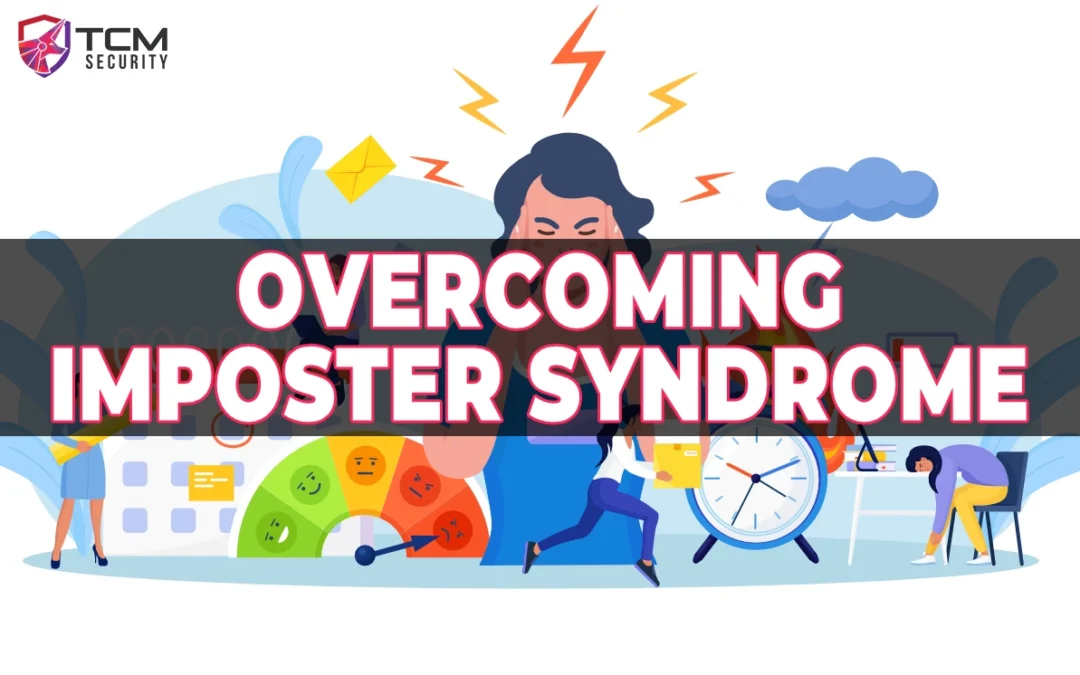Overview
Imposter syndrome can present a major hurdle for all of us in cybersecurity. Even after dedicating countless hours to studying and training, that nagging sense of self-doubt can make us question our skills and abilities. However, it’s important to recognize that imposter feelings are fundamentally irrational and that we can overcome them through intentional efforts.
What is Imposter Syndrome?
According to WebMD, imposter syndrome is “when you doubt your own skills and successes. You feel you’re not as talented or worthy as others believe, and you’re scared that one day, people will realize that.”
At its core, imposter syndrome involves persistently feeling incompetent – despite concrete evidence of ability and success. These self-doubting thoughts can manifest as internal criticisms like “I don’t really know what I’m doing” or “I’m just faking my way through.” Allowing these thoughts to persist and this mindset to prevail imposter syndrome can seriously undermine your confidence and derail your cybersecurity career pursuits. The solution lies in implementing a few specific strategies to help reframe your mindset.
Although it’s not a mental health diagnosis, imposter syndrome can cause real harm in different areas of your life.
Identify Imposter Thought Patterns
The first step to shutting down imposter syndrome is to recognize your typical thought patterns and the internal narratives that enable it.
You may be slipping into imposter syndrome if you:
- Focus on mistakes rather than successes
- Ignore positive feedback as luck or timing
- Set wild expectations of having to know absolutely everything
Once you start noticing these imposter thoughts, you can consciously challenge them. A great tactic is to rephrase the negative thoughts more objectively, such as acknowledging “I may not have 100% mastery yet, but I am continuously learning and improving.”
Cultivate a Growth Mindset
Imposter feelings often stem from an unhealthy “fixed” mindset – the limiting belief that skills and intelligence are static traits. In reality, abilities can be developed through dedication and effort, a paradigm known as a “growth” mindset. By adopting a growth mindset, you can approach each challenge or cybersecurity concept not as a pass/fail test, but as an opportunity to really stretch your knowledge.
Consistently recognizing small wins and incorporating feedback also reinforces a growth mindset. For example, congratulate yourself when you independently troubleshoot an issue rather than attributing it to chance. As time goes on, this shift in mindset helps you recognize struggles as stepping stones to success. Every one of those stones counts toward mastery, no matter how big or small.
Build a Support System
One of the worst aspects of imposter syndrome is that it completely isolates you into feeling alone with your self-doubt. However, tapping into cybersecurity communities can provide an invaluable source of relatability, encouragement, and advice for overcoming imposter feelings.
For example, TCM Security has an incredibly active Discord server where cybersecurity students (and professionals!) can connect with peers who are also navigating their learning journeys. In the server, there are dedicated channels for course support, infosec, programming, as well mentorship and career guidance. You’ll also find plenty of amazing people celebrating successes – no matter how big or small.
The power of this supportive online community is two-fold. First, it shatters the misconception that you’re the only one facing insecurities. Simply lurking in the channels provides a powerful perspective. You’ll find many other members openly expressing doubts or “imposter moments” that we all can deeply relate to.
Secondly, the server’s culture of support and feedback helps to continually reinforce your growth mindset. Maybe you struggled with a particular concept, but received valuable tips from mentors or peers who successfully navigated that same challenge.By crowd-sourcing expertise and celebrating each other’s achievements, the community significantly boosts confidence.
Don’t underestimate the psychological impact of verbalizing your own imposter feelings. There’s something cathartic and validating about bringing those thoughts out into the open. Simply expressing your vulnerability can itself alleviate some of the negative effects of imposter syndrome. Submitting your “self – vulnerability” you might say.
So take advantage of online communities! There are plenty of supportive online communities that can help you reach your goals. Enjoy an environment where doubts are normalized, successes are amplified, and you’re surrounded by individuals committed to helping one another continually grow.
Conclusion
Imposter syndrome is frustrating, period. But you can overcome it through self-awareness, shifting your mindset, and finding a support system within our cyber community. By learning and identifying your personal thought patterns, creating a growth mindset, and tapping into the community, you can conquer these imposter feelings.
The cybersecurity journey is not about achieving perfection from day one. It’s about confronting self-doubt with self-compassion, so that you can fully embrace the lifelong journey of learning. You’ve got this!

About the Author: Dan Berger
Dan (Dz@$t3r) is a cybersecurity professional and US Air Force veteran, currently a Desktop Support Engineer at TCM Security. Cultivating a passion for penetration testing, he has bolstered his offensive security skills with certifications such as PJMT, PJPT, and PNPT.
When not in cybersecurity mode, Dan lets his creative side loose as a metal vocalist and multimedia artist. Whether producing music, film, or graphic design, his creative curiosity matches his passion for offensive security.
Combining equal parts cyber skill and artistic creativity, Dan brings a unique perspective to the world of cybersecurity.
About TCM Security
TCM Security is a veteran-owned, cybersecurity services and education company founded in Charlotte, NC. Our services division has the mission of protecting people, sensitive data, and systems. With decades of combined experience, thousands of hours of practice, and core values from our time in service, we use our skill set to secure your environment. The TCM Security Academy is an educational platform dedicated to providing affordable, top-notch cybersecurity training to our individual students and corporate clients including both self-paced and instructor-led online courses as well as custom training solutions. We also provide several vendor-agnostic, practical hands-on certification exams to ensure proven job-ready skills to prospective employers.
Pentest Services: https://tcmdev.tcmsecurity.com/our-services/
Follow Us: Blog | LinkedIn | YouTube | Twitter | Facebook | Instagram
Contact Us: sales@tcm-sec.com
See How We Can Secure Your Assets
Let’s talk about how TCM Security can solve your cybersecurity needs. Give us a call, send us an e-mail, or fill out the contact form below to get started.

